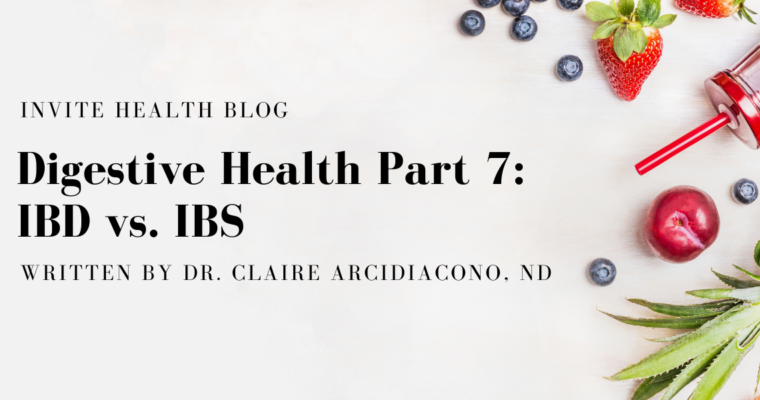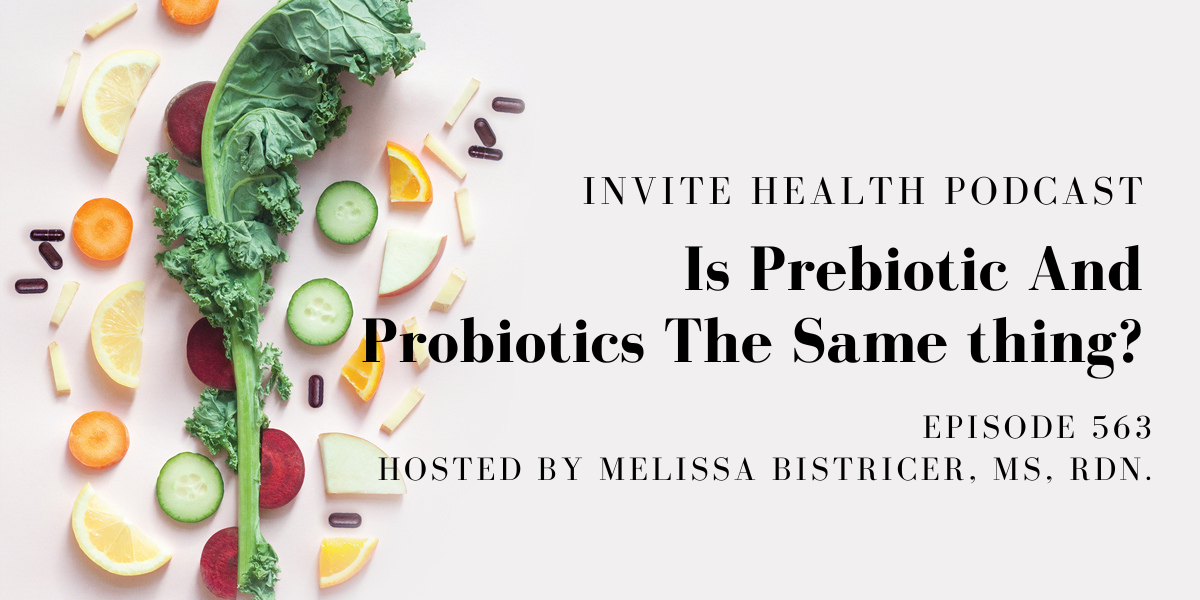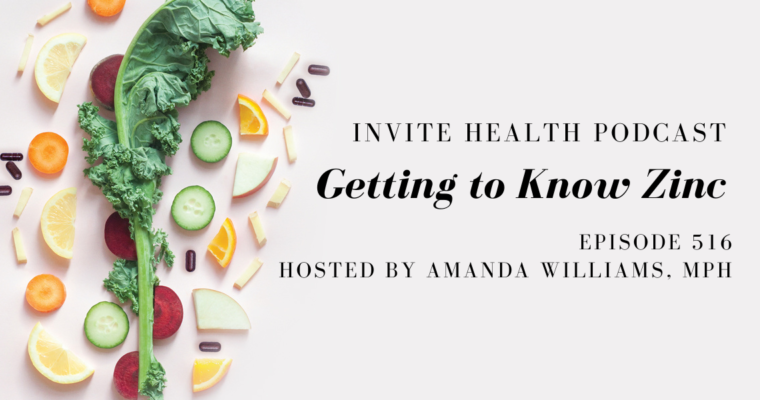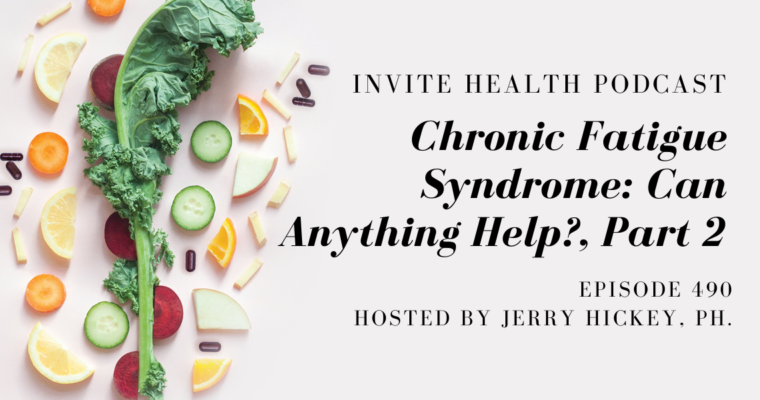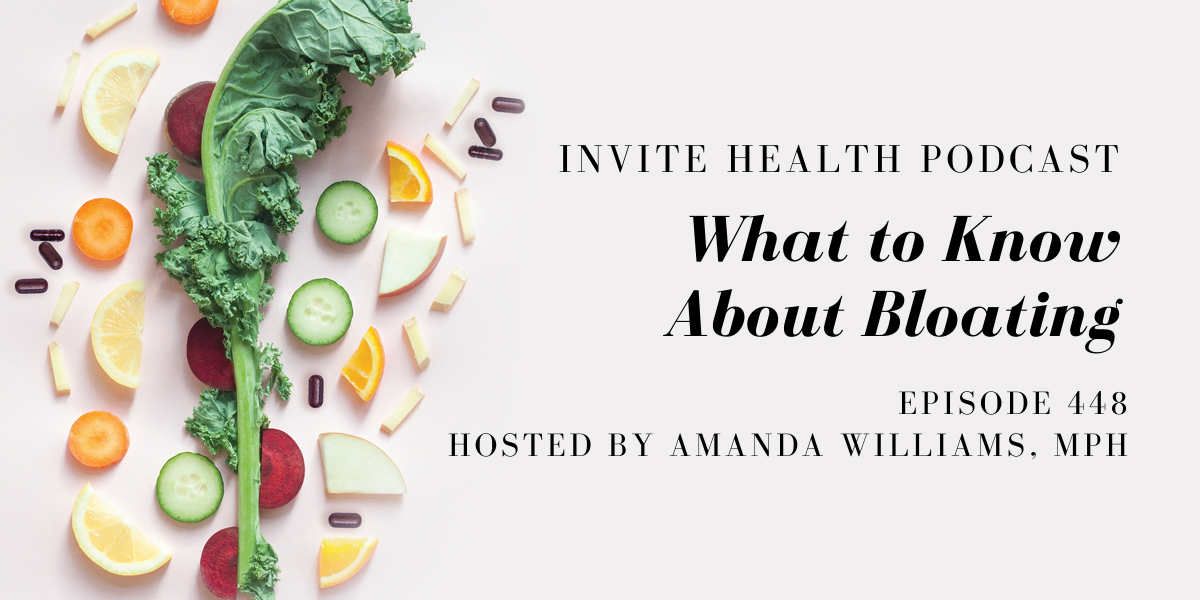Prebiotic
Subscribe Today!
Please see below for a complete transcript of this episode.
Is Prebiotic And Probiotics The Same thing? – InViteⓇ Health Podcast, Episode 563
Hosted by Jerry Hickey, Ph.
*Intro music*
InViteⓇ Health Podcast Intro: Welcome to the InViteⓇ Health Podcast, where our degreed healthcare professionals are excited to offer you the most important health and wellness information you need to make informed choices about your health. You can learn more about the products discussed in each of these episodes and all that InViteⓇ Health has to offer at www.invitehealth.com/podcast. First time customers can use promo code PODCAST at checkout for an additional 15% off your first purchase. Let’s get started! †
*Intro music*
Melissa Bistricer, MS, RDN: [00:00:40] Welcome back to another podcast here at InViteⓇ Health. So oftentimes we hear about prebiotics and probiotics. Are they beneficial? Yes, they are. But you may be asking yourself, what is the difference between a prebiotic and a probiotic, which I will be discussing today and seeing where you can get prebiotics and probiotics from foods and supplements. † [00:01:03]
[00:01:04] My name is Melissa Bistricer and I am a registered dietitian. I am so excited to bring to you the nutritional aspect of nutrients here at InViteⓇ Health. Nutrition, food for thought: exercise is king, nutrition is queen put them together and you’ve got a kingdom. InViteⓇ Health promotes an integrative approach and providing vitamins into your daily life to increase your quality of life. In conjunction with nutrients, it is also important to learn and include other lifestyle modifications like nutrition, exercise, and sleep. These practices with the use of vitamins will promote optimal benefit in your daily life. † [00:01:40]
[00:01:41] Probiotics are living organisms that are in foods and supplements. They are intended to help improve the good bacteria in our body, also known as normal microflora. A probiotic is made up of good bacteria or yeast that are naturally found in our body. There are always good and bad bacteria in the body, but when an infection occurs in our bodies, that means there is more of the bad bacteria affecting our system. When the body has more good bacteria, this helps to get rid of any extra bad bacteria that the body does not need returning our body to a normal balance. Probiotics again, help our microbiome. Microbiome is a diverse community of organisms that help the entire body work together to help keep us healthy. The community is made up of microbes. Those are throughout our body. These microbes are bacteria, fungi like yeast and viruses. Microbes live throughout the body. But the most common place that are beneficial is the gut, mostly in the large intestine. There are also within our gut, mouth, urinary tract, skin and lungs. The main job of a probiotic is to provide good bacteria to maintain a healthy balance in the body. When we get sick with an infection, that will knock us off our balance. Think of a probiotic keeping us in check, providing us with a good bacterium to help support our immune health, inflammation and help the body digest food, absorb nutrients, vitamins and minerals, support the cells that line our gut health to prevent bad bacteria from entering into the body and break down or absorb any medication you may be on. † [00:03:21]
[00:03:21] This process is naturally happening in the body, so you may not need to be taking a probiotic at all. The most common sign your body needs more probiotics, either through foods or supplement is well, while being on antibiotics due to the antibiotics stripping the body of that bacteria along with good bacteria. When we want to get rid of the extra bad bacteria but replenish the good bacteria to bring our body back into a normal microflora, you may want to start taking a probiotic when you find yourself getting sick or feeling bloated, unwell or having any skin issues. There are also certain conditions that additional probiotics may be beneficial for like diarrhea, constipation, irritable bowel disease, irritable bowel syndrome, yeast infection, urinary tract infection, eczema, lactose intolerance, and lastly, gum disease. † [00:04:11]
WHY YOU SHOULD TAKE A PROBIOTIC WHEN ON ANTIBIOTICS – INVITE HEALTH PODCAST, EPISODE 275 >> Listen Now!
[00:04:13] I would highly suggest that you talk with your health care provider to see if you may benefit from using an additional probiotic supplement. There are also foods that support our gut and provide us with good bacteria such as yogurt, kefir, sauerkraut, miso, sour dough bread, and my ultimate favorite kombucha. If you have never tried kombucha, you definitely should, they are delicious. If you eat or drink these daily, you are naturally providing food sources of probiotics straight to your body without having to take a supplement. Now the strains of probiotics can get confusing for some individuals, since there are so many. I just wanted to name the most popular ones that are found in our Probiotic HxⓇ. Since these are the most commonly seen in probiotic supplements, the strains are lactobacillus and Bifidobacterium. † [00:04:58]

[00:05:00] Prebiotics are essentially plant fibers found to help healthy bacteria grow in the gut to help the digestive tract work more effectively. Prebiotics essentially are food sources such as carbohydrate, high fiber that the body has a hard time to digest in order for them to go to a lower part of the digestive tract, so they are free to help our healthy bacteria in the gut flourish. Prebiotic foods are in a lot of fruits and vegetables, such as apples, artichokes, asparagus, bananas, berries and whole grains, barley, cocoa, dandelion greens and flaxseed. Think anything high in fiber that is mostly likely going to be a prebiotic food. Prebiotics are not only beneficial for our gut, but can also help to absorb calcium, can help to maintain blood sugars, preventing spikes in our blood sugars, fermented foods faster, meaning it can spend less time in our digestive system to prevent constipation or digestive health issues. And it keeps the cell lining of our gut healthy. † [00:06:01]
[00:06:02] Although prebiotics are beneficial for most individuals, those who cannot tolerate fiber foods should talk to a health care provider to see their recommendations. I would try to stay away from prebiotic foods if you have IBS, irritable bowel syndrome or SIBO to eliminate symptoms that may occur such as bloating, constipation, diarrhea or gas. Prebiotics and probiotics are both beneficial to supporting the body with a healthy colony of bacteria and other microorganisms to help the gut and digestive health. Prebiotics are presented in high fiber foods where probiotics are in fermented foods. Prebiotics and probiotics essentially work together where prebiotics are seen to be the food for probiotics. Therefore, healthy individuals who consume a balanced diet, rich in fermented and fiber foods, should be beneficial for individuals to sustain a healthy gut microbiome. A diet rich in fruits, vegetables, whole grains and fermented products can be sufficient with a pre-and probiotic without relying on supplements. Does someone who has a weakened immune system and underlying issues may benefit from consuming a probiotic supplement to help the gut further. † [00:07:12]
[00:07:14] So just to recap really quickly, the difference between probiotic and prebiotic is that a probiotic is a live bacteria or yeast, and prebiotic is the food that probiotic thrives on to survive. Prebiotic is from food sources high in fiber that the body cannot generally absorb, such as fruits, vegetables and whole grains. And probiotics are found in fermented foods and drinks, such as yogurt, fermented pickles, sauerkraut, kefir, cottage cheese and kombucha. You can also get probiotics in a capsule form where you can check out the product on invitehealth.com. Our product has five different clinically studied strains to help with overall healthy bacteria to support digestive health, immune health and skin health. † [00:07:55]
CLINICALLY STUDIED STRAINS OF BACTERIA TO SUPPORT OVERALL HEALTH – INVITE HEALTH PODCAST, EPISODE 288 >> Listen Now!
[00:07:55] The big takeaway here is that if you want to support your gut and digestive health, start to increase your intake of probiotic foods and prebiotic foods. In certain conditions a probiotic may be beneficial, so definitely check out our probiotic HxⓇ sold at invitehealth.com. And if you have any further questions about this product, if it’s beneficial for your gut health, you can certainly chat with myself as a nutritionist or any other health care providers to assist you here at invitehealth.com or email me at mbistricer@invitehealth.com. † [00:08:25]
[00:08:25] I am Melissa Bistricer, RDN ready to share the knowledge to help you modify your lifestyle to live a happier and more successful life. I am looking forward to continuing to provide you with educational podcasts and blog posts. I want to thank you so much for tuning in to the InViteⓇ Health Podcast. Remember, you can find any of our episodes for free wherever you listen to podcasts or by visiting invitehealth.com/podcast. Again, nutrition food for thought: exercise is king, nutrition is queen put them together and you’ve got a kingdom. Have a great day and tune in for the next podcast coming your way soon. † [00:08:25]
*Exit Music*



